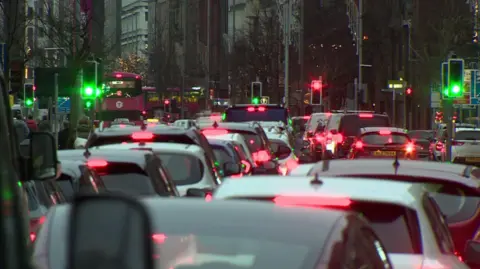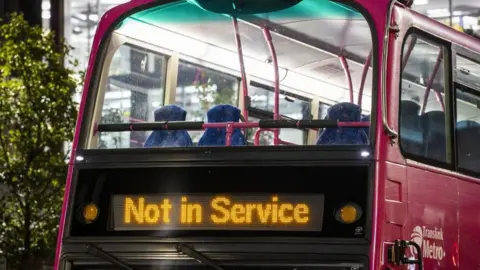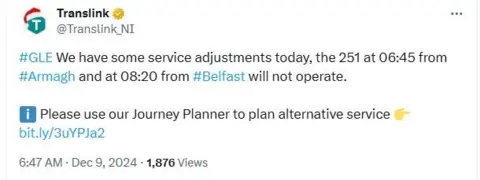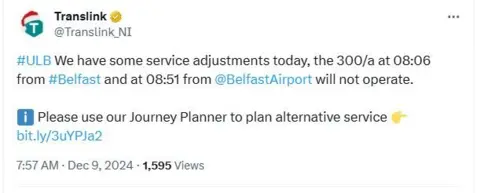Translink apology for bus disruption caused by city congestion
 BBC
BBCThe head of transport company Translink has apologised to passengers affected by recent disruption to some bus services caused by traffic congestion in Belfast.
Chris Conway said the company was doing all it could to lessen the impact, after weeks of heavy traffic in the city centre at peak times.
His comments came after Infrastructure Minister John O'Dowd said he would give more money to subsidise Translink, if he could.
O'Dowd said that "there have been delays to Translink services but the vast majority are running" and he has suggested that commuters should get out of the car and use public transport.
The SDLP's Matthew O'Toole, who scheduled an urgent question in the assembly about the traffic, said Northern Ireland's bus network was such "a disaster" it is preventing people from leaving their car at home and reducing traffic in Belfast city centre.
Translink said that more than 400,000 additional journeys have been made on buses and trains in the last two months - compared to the same time last year.
The company said that was down to an increase in services, including new hourly Enterprise trains to Dublin.
 PA Media
PA MediaTranslink Chief Executive Chris Conway told BBC Radio Ulster's Evening Extra programme: "We have issues with congestion and our bus network is caught up in that as well.
"We're certainly not happy with that and, certainly, I would apologise to our passengers for any impact that has on them.
"What we are trying to do is to just manage that as best we can.
"We will try and help passengers on to the next service, on to an alternative service, or we will move stop stops try and improve punctuality and reliability."
He also said that Belfast's "low car parking charges are attracting people in to the city", adding that "a lot of that parking is on-street parking which "could be freed up for better road space for vehicles".
Mr Conway also called for a review into Belfast's bus lanes as he said they were "designed in Belfast was back in 2012".
Earlier, O'Toole, who leads the opposition at Stormont, told BBC's Good Morning Ulster programme that Northern Ireland's public transport network has suffered "generational under-investment... for a long time".
He added that the bus network has failed people "over a long time", citing that information given on bus stop screens and online is often "completely wrong".
His comments came as The Nolan Show investigated the running of a number of services and found that Translink were announcing information updates on some routes after the service was due.
Translink said they operate about 63,000 bus services but can run into "a small percentage of cancellations".
A spokesperson said: "These can be for many reasons including heavy traffic, road traffic accidents, weather conditions and mechanical issues.
"We advise passengers to plan ahead and leave extra time for their journey during the busy pre-Christmas period and check Translink's social media channels, Journey Planner and Contact Centre."


Responding later on Tuesday, O'Dowd told BBC Radio Ulster's Talkback show: "Thousands of people use Translink services in Belfast and the greater Belfast area, thousands of people use Translink services to get in and out if Belfast every day but it is hugely regrettable when a service is cancelled."
O'Dowd added there is no quick fix solution to the current challenges faced by commuters to Belfast, but reiterated that "if you are going into Belfast in a private car, you should expect congestion".
'Worst subsidised regions'
Meanwhile the chair of Stormont's infrastructure committee said public transport in Northern Ireland is too expensive to encourage people to leave the car at home.
DUP assembly member Deborah Erskine told BBC's Good Morning Ulster programme, that the Department of Infrastructure needs to do more to ease congestion in Belfast city centre, after an official said people should work from home one day a week to help with traffic problems.
Ms Erskine said people cannot be expected to make these lifestyle changes with the current public transport system.
"We are one of the worst subsidised regions in the whole of the UK as well in relation to our public transport. So if we're telling people to get out of their car, get on to public transport, we have to expand that network and we have to make it a fair and equitable choice for people."
Roger Pollen, from the Federation of Small Businesses, said: "The department operates the roads and the buses, and there is a real potential for a conflict of interest there.
"So, they have actually reduced the capacity on the roads for cars to the advantage of the bus service that they own and operate, and I think they have done it in a fairly chaotic way."
He suggested that park and rides could be made free to the end of January because traders are "really struggling".
The Licensed Taxi Operators Association said the issue lies with "the sheer volume" of cars on the road, the newly-opened Grand Central Station and roadworks.
They said: "Taxis are public transport and are as much a part of the solution to these issues as buses and trains.
"The difference, however, is that increasing bus and train provision, which we wholeheartedly support, is a long-term solution which requires significant operational and financial investment, whereas improving taxi efficiency could be delivered quickly and with little cost to the public purse."
The organisation said the wait for the allowance of taxis to use bus lanes is adding to congestion.
